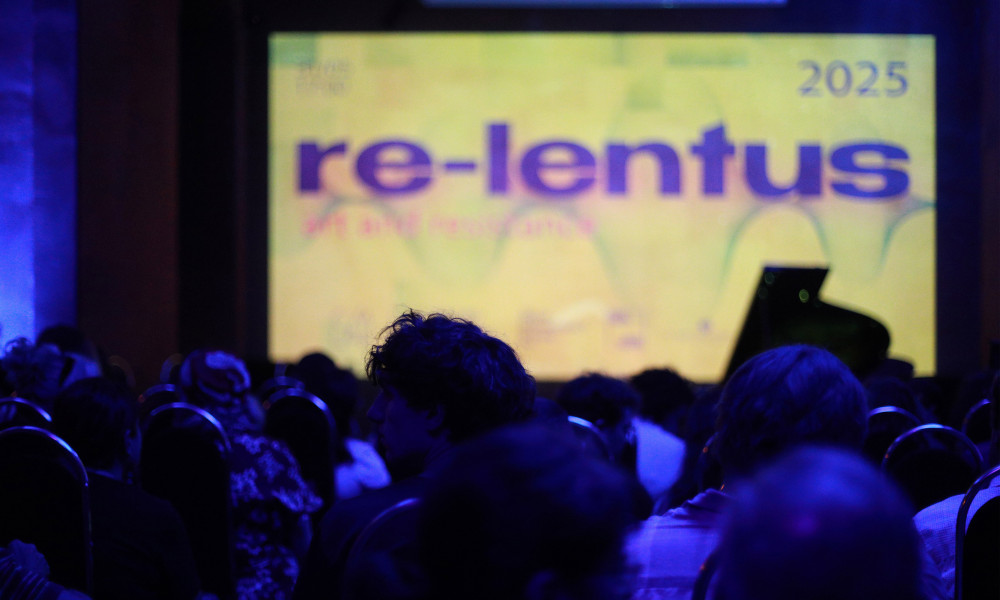This year, the annual Re-Lentus program launched in Yerevan, bringing together Armenian and Georgian cultural figures, artists, and activists in a spirit of mutual support to reflect on how art can become a tool of resistance in a region where political repression is steadily increasing.
Initiated by the Cultural and Social Narratives Laboratory (CSN Lab, Armenia) in collaboration with the Culture and Management Lab (Georgia), this year’s event – “Re-Lentus: Art and Resistance” has become a platform for Armenian-Georgian cultural dialogue, with a focus on amplifying women’s voices.
For over 180 days, thousands of citizens in Tbilisi have taken to Rustaveli Avenue to peacefully express their protest and outrage in defense of democracy and freedom. At the forefront of these demonstrations are often artists and cultural figures. Yet the spirit of resistance extends beyond Tbilisi and the borders of Georgia’s cities, both large and small. On May 31, at the Arno Babajanyan Concert Hall in Yerevan, that protest found its echo -- not through chants, but through music.
Centered on the interelationship between art and resistance, Re-Lentus 2025 welcomed 3 exceptional Georgian musicians – Nino Jvania, Elene Gogodze, and Eka Chabashvili – who use their music to voice the hopes and struggles of Georgian society.
Whereas previous editions focused on themes such as activism, literature, urban planning, and architecture, this year's dialogue – set against the backdrop of shrinking civic spaces and the rise of authoritarian regimes – responded to the urgency of the moment, demonstrating that resistance through art is not only relevant, but necessary.
Within the framework of the program, the Georgian musicians had the opportunity to visit key cultural landmarks, including the Cafesjian Center for the Arts and the Komitas Museum-Institute. These visits aimed not only to immerse the participants in Armenia’s cultural landscape but also to foster potential partnerships between creatives from both countries, planting seeds for future collaborations.
The three-day dialogue program concluded with a final public event on May 31 – during which the three Georgian musicians gave talks on Georgia's complex social-political situation, as well as unique musical performances that reflected the crises facing the country and society at large.
Pianist and scholar Nino Jvania opened the evening with a riveting talk and performance reflecting on the historical and contemporary role of music in political protest. Drawing from her firsthand experience in the ongoing anti-government demonstrations in Georgia, Jvania shared her involvement through music in the protests - tracing a sonic genealogy of resistance echoing in today's streets of Tbilisi. Her performance, featuring music composed by Eka Chabashvili, captured both tenderness and urgency, embodying the protest through piano.
Violist and composer Elene Gogodze delivered a participatory performance, blending viola, her own vocals, and the voices of the audience. Rooted in Georgian folk and mythological motifs, her unconventional, experimental performance went beyond sound, it was also a reflection on what it means to be a musician in the Caucasus. Gogodze shared her experiences navigating the complexities of self-discovery and self-expression as an artist in the region. Her performance was not only a sonic experiment, but also a statement of personal and political orientation within a layered social context.
The evening concluded with a compelling talk and performance by composer Eka Chabashvili. In her presentation, Chabashvili shared the philosophical foundations of her creative practice, particularly her commitment to ecocentrism – a stance that critiques the violence and hierarchies inherent in anthropocentric thinking. Reframing care and resistance through an ecocentric lens, she invited the audience to consider how sonic and artistic practices can disrupt dominant structures and help imagine a world where sounds coexist in harmony.
Her multimedia project, which combined archival materials and audiovisual recordings with a live piano performance by Nino Jvania, conveyed both the alienating experience of anthropocentrism and the healing potential of ecocentric perspectives.
Dozens of artists, cultural workers, researchers, and civil society representatives warmly embraced the event. For many – especially those who have experienced the recent events in Georgia or have personally felt the impact of political repression and restrictions – this gathering became an important space for dialogue and mutual support.
At this critical moment, standing alongside Georgia is not merely a symbolic gesture – it is a vital necessity. The stability of democracy in the South Caucasus depends directly on regional solidarity.
In this spirit, the Georgian phase of the Re-Lentus program will soon take place, featuring a series of events aimed at strengthening Armenian-Georgian cultural ties.
Re-Lentus annual cultural project is implemented by the CSN Lab (Armenia) and CuMaLab (Georgia) with the support of the Danish Cultural Institute (DCI) within the New Democracy Fund (NDF) programme.

